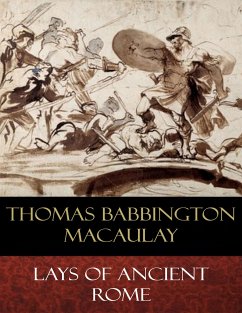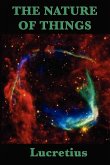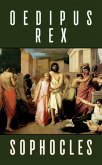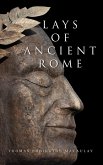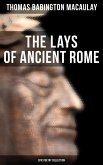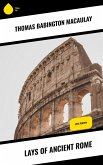Lays of Ancient Rome is collection of ballads about heroic episodes in Roman history written by Thomas Babington Macaulay, becoming immensely popular in Victorian times, and were a popular subject for recitation, a common pastime of the era. It was set reading in British public schools for more than a hundred years.
The Roman ballads are preceded by brief introductions, discussing the legends from a scholarly perspective. Macaulay explains that his intention was to write poems resembling those that might have been sung in ancient times.
Thomas Babington Macaulay (1800–1859) was a British historian and Whig politician. He wrote extensively as an essayist and reviewer; his books on British history have been hailed as literary masterpieces.
The Poems:
In the first poem, Horatius, describes how Publius Horatius and two companions, Spurius Lartius and Titus Herminius, held the Sublician bridge against the Etruscan army of Lars Porsena, King of Clusium. The three heroes are willing to die in order to prevent the enemy from crossing the bridge, and sacking an otherwise ill-defended Rome. While the trio close with the front ranks of the Etruscans, the Romans hurriedly work to demolish the bridge, leaving their enemies on the wrong side of the swollen Tiber.
The Battle of Lake Regillus, celebrates the Roman victory over the Latin League, at the Battle of Lake Regillus. Several years after the retreat of Porsena, Rome was threatened by a Latin army led by the deposed Roman king, Lucius Tarquinius Superbus, together with his son, Titus Tarquinius, and his son-in-law, Octavius Mamilius, prince of Tusculum. The fighting described by Macaulay is fierce and bloody, and the outcome is only decided when the twin gods Castor and Pollux descend to the battlefield on the side of Rome.
Virginia, describes the tragedy of Virginia, the only daughter of Virginius, a poor Roman farmer. The wicked Appius Claudius, a member of one of Rome's most noble patrician families, and head of the college of decemvirs, desires the beautiful and virtuous Virginia. He initiates legal proceedings, claiming Virginia as his "runaway slave", knowing that his claim will be endorsed by the corrupt magistracy over which he and his cronies preside. Driven to despair, Virginius resolves to save his daughter from Claudius' lust by any means—even her death is preferable.
The Prophecy of Capys, When Romulus and Remus arrive in triumph at the house of their grandfather, Capys, the blind old man enters a prophetic trance. He foretells the future greatness of Romulus' descendants, and their ultimate victory over their enemies in the Pyhrric and Punic wars.
The Roman ballads are preceded by brief introductions, discussing the legends from a scholarly perspective. Macaulay explains that his intention was to write poems resembling those that might have been sung in ancient times.
Thomas Babington Macaulay (1800–1859) was a British historian and Whig politician. He wrote extensively as an essayist and reviewer; his books on British history have been hailed as literary masterpieces.
The Poems:
In the first poem, Horatius, describes how Publius Horatius and two companions, Spurius Lartius and Titus Herminius, held the Sublician bridge against the Etruscan army of Lars Porsena, King of Clusium. The three heroes are willing to die in order to prevent the enemy from crossing the bridge, and sacking an otherwise ill-defended Rome. While the trio close with the front ranks of the Etruscans, the Romans hurriedly work to demolish the bridge, leaving their enemies on the wrong side of the swollen Tiber.
The Battle of Lake Regillus, celebrates the Roman victory over the Latin League, at the Battle of Lake Regillus. Several years after the retreat of Porsena, Rome was threatened by a Latin army led by the deposed Roman king, Lucius Tarquinius Superbus, together with his son, Titus Tarquinius, and his son-in-law, Octavius Mamilius, prince of Tusculum. The fighting described by Macaulay is fierce and bloody, and the outcome is only decided when the twin gods Castor and Pollux descend to the battlefield on the side of Rome.
Virginia, describes the tragedy of Virginia, the only daughter of Virginius, a poor Roman farmer. The wicked Appius Claudius, a member of one of Rome's most noble patrician families, and head of the college of decemvirs, desires the beautiful and virtuous Virginia. He initiates legal proceedings, claiming Virginia as his "runaway slave", knowing that his claim will be endorsed by the corrupt magistracy over which he and his cronies preside. Driven to despair, Virginius resolves to save his daughter from Claudius' lust by any means—even her death is preferable.
The Prophecy of Capys, When Romulus and Remus arrive in triumph at the house of their grandfather, Capys, the blind old man enters a prophetic trance. He foretells the future greatness of Romulus' descendants, and their ultimate victory over their enemies in the Pyhrric and Punic wars.

